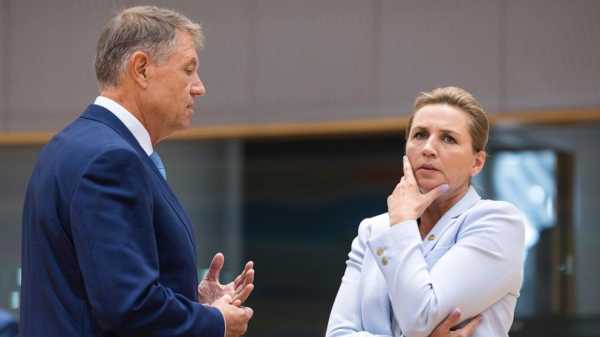
BRUSSELS — Poland’s prime minister insisted Thursday that the country wouldn't be forced to accept European Union rules on migration, and he vowed to veto any plan that might force countries to take in refugees.
“An attack on Europe is underway. Europe’s borders are not secure. The safety of the inhabitants of our continent is at stake,” Prime Minister Mateusz Morawiecki said in a video statement. He said he would propose “a plan for secure borders” to EU leaders at a summit in Brussels.
Earlier this month, EU countries made a breakthrough on asylum law reform, sealing an agreement on a plan to share responsibility for migrants entering Europe without authorization. The issue is at the root of one of the bloc’s longest-running political crises.
The deal balanced the obligation for countries where most migrants arrive to process and lodge them against the requirement for other members to provide support, whether financial or by hosting refugees. Countries refusing to take migrants in could pay 20,000 euros ($21,400) per person instead.
The agreement was sealed with a qualified majority vote of around two-thirds. Only Poland and Hungary voted against. Their aim at the summit is to challenge the legal validity of that decision.
Morawiecki said that his “plan is clear — ‘no’ to forced relocation of immigrants, ‘no’ to violations of veto rights by individual states and ‘no’ to violations of the principle of freedom, the principle of decision-making by states alone, ‘no’ to Brussels-imposed penalties on states.”
Poland and Hungary, along with the Czech Republic, refused to accept migrant quotas hastily imposed by the EU in 2015 as well over a million people, mostly Syrians fleeing conflict, entered Europe. The EU’s top court ruled in 2020 that they had failed to respect the bloc’s laws.
The number of people trying to enter the EU without authorization is on the rise. The border and coast guard agency Frontex said that more than 50,300 attempts were made from January to May. It’s more than double in the same period last year, and the most since 2017. But migrant arrivals in Europe dwarf those seen in Turkey, Lebanon or Jordan.
At the same time, Poland is looking after around 1 million refugees from Ukraine.
Any attempt to court the help of Italian Prime Minister Giorgia Meloni, whose anti-migrant government abstained in the vote on the breakthrough deal, appears unlikely to succeed.
“I perfectly understand the point of views of nations who have different problems with migration. But I think that the agreement that was found was a balanced one,” Meloni told reporters at the summit.
Hungary and Poland appear unlikely to succeed in their quest to have the rules overturned, but their anti-immigrant stance — backed by other members like Austria, Denmark or Sweden — has helped ensure that the EU’s policies focus on keeping people out and quickly deporting those not entitled to stay.
Prime Minister Ulf Kristersson of Sweden, which currently holds the EU’s rotating presidency, said that only people who are entitled to stay should be allowed in.
“We cannot continue a situation in which people without permits simply travel through Europe and to countries and live in circumstances that are not acceptable. This is one of the converging views in Europe right now. We simply have to do something about that,” he told reporters.
The leaders will say that they “remain committed to breaking the business model of traffickers and smuggling networks … and to tackling the root causes of irregular migration so as to better address the flows of migrants,” according to a draft of their summit statement seen by The Associated Press.
However, the breakthrough deal opposed by Hungary and Poland — which took years to seal — still must be endorsed by the European Parliament. Lawmakers insist that countries must accept mandatory refugee quotas and that stance would torpedo the plan unless they back down.
___
Vanessa Gera reported from Warsaw.
___
Follow AP’s global migration coverage at https://apnews.com/hub/migration
Sourse: abcnews.go.com






